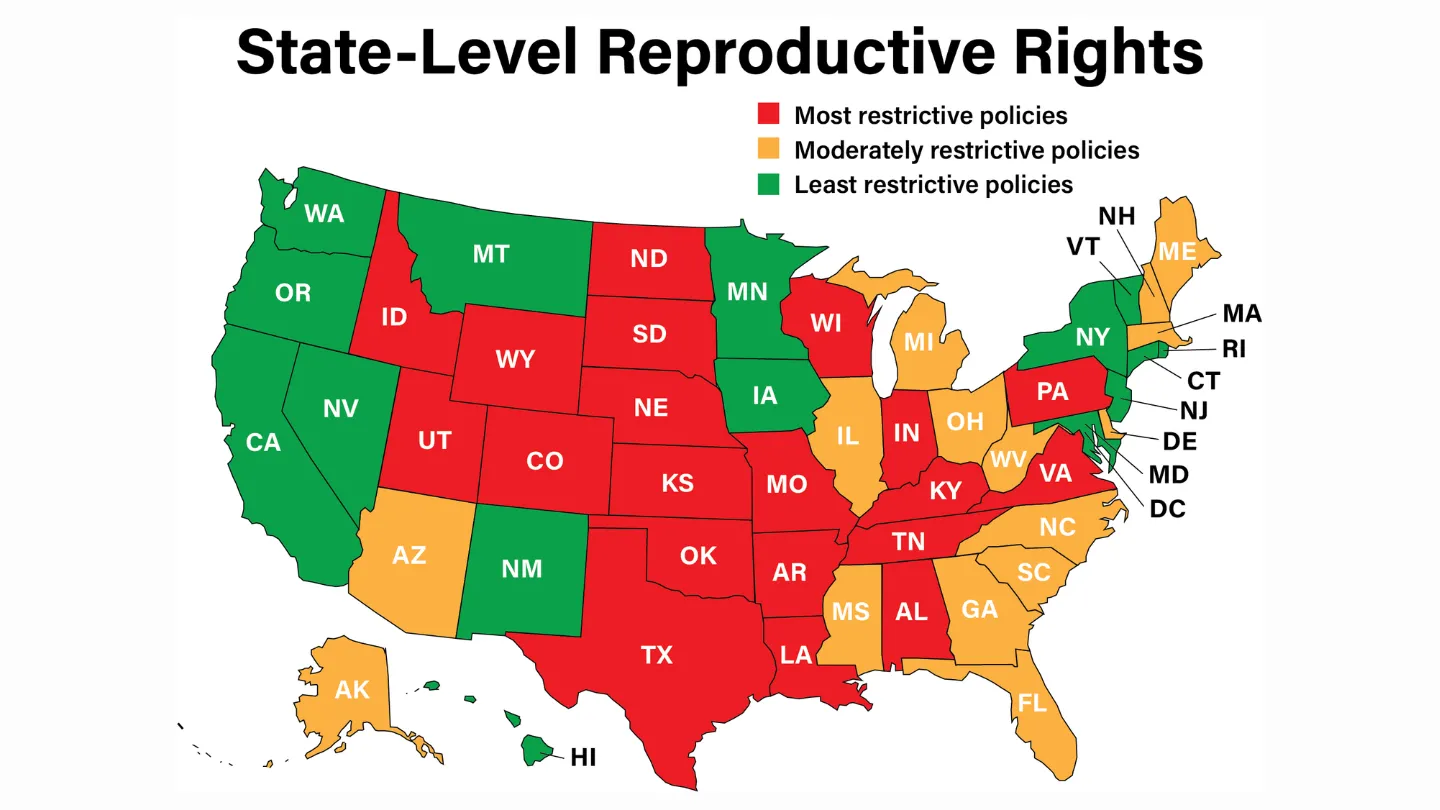When reproductive rights are less restrictive, babies are born healthier
UCLA-led research finds women, particularly Black women, in states with restrictive reproductive rights policies deliver more low birth weight babies.

American women living in states with less restrictive reproductive rights policies are less likely to give birth to low-birth weight babies, according to a team led by UCLA Fielding School of Public Health researchers.
Compared to infants of normal weight, low birth weight newborns may be more at risk for numerous health problems. Some infants may become sick in the first six days of life or develop infections. Other children may suffer from long-term problems, including delayed motor and social development or learning disabilities.
The study, published by the American Journal of Preventive Medicine found that mothers, particularly U.S.-born Black women, giving birth in states with less restrictive reproductive rights policies have a 7% lower risk of low-birth weight babies, compared to women in states with more restrictive policies.
“Our study provides evidence that reproductive rights policies play a critical role in advancing maternal and child health equity,” said May Sudhinaraset, associate professor of the UCLA Fielding School’s Department of Community Health Sciences. “Addressing the adverse consequences of structural racism requires examination of the historical and present-day policies that negatively affect women of color.”

This map indicates the reproductive rights policy climate for each state plus the District of Columbia in the year prior to when women gave birth in 2016 (i.e., preconception year). Data were compiled in 2014 and 2015 (Credit: Elsevier).
Compared with women living in states with the most restrictive reproductive rights policies, women living in the least restrictive states had a 7% lower risk of low-birth weight babies. Low-birth weight risk for newborns was 8% lower among Black mothers living in states with the least restrictive reproductive rights policies, compared with their counterparts living in the most restrictive states.
The study, conducted by researchers at UCLA and the Tulane University School of Public Health and Tropical Medicine, analyzed birth record data for the nearly 4 million births that occurred in the 50 states and the District of Columbia in 2016 to assess the associations between reproductive rights policies and adverse birth outcomes. The investigators, including Jessica D. Gipson, associate professor of the UCLA Fielding School’s Department of Community Health Sciences, and Marta Bornstein, a doctoral student at the Fielding School and the UCLA California Center for Population Research, further evaluated if the associations were different for women of color and immigrants.
“This study shines the light on the effect of reproductive rights policies, and the broader social context in which these policies are created and implemented, on women’s bodies and the lives and well-being of our children,” Gipson said. “It is critical that we continue to assess the negative impacts of restrictive reproductive rights policies, while also identifying supportive policies and programs for women, and particularly Black women, to achieve optimal health for this and for the next generation.”
The study indicates that expanding reproductive rights may actually decrease the risk of low-birth weight babies, particularly for US-born Black women. Specifically, the findings showed significant associations between low-birth weight newborns and states’ reproductive rights climate among U.S.-born, but not foreign-born, Black women.
“Future studies should assess specific evidence-based policies, particularly highlighting women’s lived experiences of policy exclusion or inclusion, and the effects on women and newborn health,” Sudhinaraset said. “Important policy levers can and should be implemented to improve women’s reproductive health overall, including increasing abortion access and mandatory sex education in schools.”
Notes for editors:
The article is “Women’s Reproductive Rights Policies and Adverse Birth Outcomes: A State-Level Analysis to Assess the Role of Race and Nativity Status,” by May Sudhinaraset, PhD, Dovile Vilda, PhD, Jessica D. Gipson, MPH, PhD, Marta Bornstein, MPH, and Maeve E. Wallace, MPH, PhD (https://doi.org/10.1016/j.amepre.2020.07.025). It will appear in advance of the American Journal of Preventive Medicine, volume 59, issue 6 (December 2020) published by Elsevier.
This work was supported in part by the Eunice Kennedy Shriver National Institute of Child Health and Human Development Grants Numbers R01HD092653 and R01HD096070. Full text of this article is available to credentialed journalists upon request; contact Jillian B. Morgan at +1 734 936 1590 or ajpmmedia@elsevier.com.














